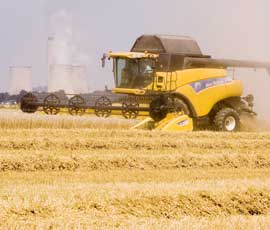UK’s third major bioethanol plant a step closer

The bioethanol industry may have got off to a shaky start with the temporary closure of Ensus after just a few months’ commercial operation, but the industry appears to have turned a corner.
Commissioning of the Vivergo plant near Hull started in April and plans for a third bioethanol facility, on the opposite side of the Humber estuary are progressing well, with commissioning expected in two years’ time, according to company bosses.
The £200m Vireol plant is the smallest and most southerly of the three UK ethanol facilities, with capacity to produce some 200m litres of bioethanol from around 500,000t of mainly UK feed wheat.
Raising finance
The project has been in development for a number of years, but is now finally moving forward, according to Tim Levy, chief executive of Future Capital Partners, which is involved with the finance of the plant.
Total cost is expected to be around £200m and he said project finance was likely to be in place by this October. “When we first investigated the project five years ago, banks weren’t particularly keen to lend and it’s taken some time to get the finance in place.
“They insisted that we carry out a retrospective analysis of how the business would have performed over the past six years [which have seen significant grain price volatility] and insisted that extra cash reserves are raised to deal with any future market volatility. The result of this is that I believe we’ve got a very robust project.”
Sourcing UK wheat
Once finance is secured, some basic site preparation is likely to begin, although the bulk of construction will take place during next year, said Vireol chief executive Dave Knibbs. “We’ll be looking to start commissioning in harvest 2014, which is when we’ll be looking for some wheat, although won’t be taking any real volumes until spring 2015.”
All wheat will be sourced through Gleadell, while Arkady Feed – a subsidiary of Toepfer International – will be responsible for distribution of the 177,000t of high protein animal feed.
Mr Knibbs says the majority of the soft, high starch, low protein wheat will be sourced directly from within the UK, although he acknowledges the plant can operate from any type of grain and there are likely to be some imports from other parts of the EU from time to time.
But he believes UK agriculture can meet the demands of three large-scale bioethanol refineries, by either growing more wheat and/or increasing yields.
“We’re the furthest south of the major ethanol producers, so will be able to access the main growing areas in the east and East Anglia. A lot of people talk about agriculture as a static market, but I don’t believe farmers won’t respond to the additional demand placed on them. The UK is more than capable of growing 20m tonnes of wheat, so there is potential to supply three plants and export the usual two to three million tonnes.”
Positive future
Mr Knibbs also admits that political issues such as uncertainty around the European Renewable Energy Directive and loopholes that allowed cheaper ethanol into the European market had made it difficult for the domestic sector to develop, but was confident these issues were being resolved. Similar issues were highlighted by Ensus as a reason for the temporary closure last spring.
“It’s good to see the UK government has recognised the importance of first generation biofuels, so I’ll think the sector will develop. The UK and Europe needs sustainable bioethanol. UK agriculture can meet the demands and having clung on through probably the most difficult time for financing a plant like this. I’m confident we’ve built a very robust model.”
UK bioethanol plants
| Ensus | Vivergo | Vireol | |
|---|---|---|---|
| Project owners | Ensus Group | Joint venture between Associated British Foods, DuPont and BP | Vireol, in partnership with Future Capital Partners |
| Location | Wilton, Teesside | Saltend, Hull | Grimsby, Humberside |
| Cost | £310m | £300m | £200m |
| Wheat required | 1.2m tonnes | 1.1m tonnes | 500,000t |
| Wheat supply partner | Glencore | Frontier/Humber Gold | Gleadell |
| Bio-ethanol output | 400m litres | 420m litres | 200m litres |
| High-protein animal feed (DDGS) | 350,000t | 500,000t | 177,000t |
| CO2 production (for industrial use) | 300,000t | – | 127,000t |
| Status | Closed temporarily in May 2011. Due to reopen sometime in 2012 | Commissioning started April 2012. Commercial operation later this year | Closing stages of securing finance. Commissioning planned for mid-2014 |
